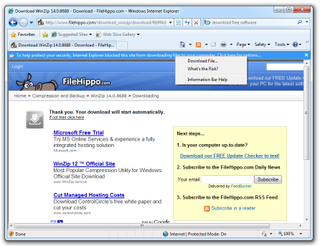Head to head: Firefox vs Internet Explorer
In our latest head to head, we weigh up the web's most popular browsers: Microsoft’s Internet Explorer and Mozilla’s Firefox.
Winner: Firefox
Features
Both IE8 and Firefox are mature browsers, and over the years they've evolved a good set of standard features to help you browse the web quickly and conveniently. Some are common to both browsers, such as opening multiple web pages in separate tabs. Type a word or phrase into the address bar and both IE8 and Firefox will show you a list of related pages, making it easy to find a site you've visited before.
Both browsers also offer a "private browsing" mode which doesn't keep any record of the pages you visit or the data you transfer useful if you work with confidential information. And if a web page tries to open a new pop-up window, it'll be intercepted regardless of which browser you're using.
But the feature sets aren't identical. One big advantage of Firefox is its simple download manager, which makes it easy to find files you've downloaded in the past, to see how quickly files are arriving and to pause and cancel transfers. IE8 has nothing like this, so it's easy to lose track of the files you've downloaded and indeed downloads which are half-way complete.

IE8 requires your explicit authorisation before it will let a website download a file to your PC.
IE8, meanwhile, offers two major unique features of its own, namely "accelerators" and "web slices". Accelerators are web-based actions that you can apply directly to a page element: for example, right-click on a paragraph of text and you can instantly post it to a blog or translate it into a different language.
Get the ITPro. daily newsletter
Receive our latest news, industry updates, featured resources and more. Sign up today to receive our FREE report on AI cyber crime & security - newly updated for 2024.
There are dozens of accelerators available to download, giving direct access to online dictionaries, SMS gateways, shopping comparison sites and more. It's a very powerful and versatile feature.
Web slices have proved less successful. The idea sounds good: tell IE8 to extract a "slice" of information from a web page, and you can then check it for updates without having to load the whole site. The trouble is, web slices only work if web developers build the technology into their sites and doing so means they risk losing exposure and advertising opportunities. As a result, very few sites support web slices.
Darien began his IT career in the 1990s as a systems engineer, later becoming an IT project manager. His formative experiences included upgrading a major multinational from token-ring networking to Ethernet, and migrating a travelling sales force from Windows 3.1 to Windows 95.
He subsequently spent some years acting as a one-man IT department for a small publishing company, before moving into journalism himself. He is now a regular contributor to IT Pro, specialising in networking and security, and serves as associate editor of PC Pro magazine with particular responsibility for business reviews and features.
You can email Darien at darien@pcpro.co.uk, or follow him on Twitter at @dariengs.





